Did you know that pumpkin seeds, often tossed aside when carving jack-o’-lanterns, are considered a superfood in many parts of the world? According to the USDA, just one ounce of pumpkin seeds (about a small handful) provides nearly 40% of your daily magnesium needs, along with protein, zinc, and healthy fats. That’s a huge nutritional punch from such a small snack.
Yet despite their incredible benefits, most people don’t think of pumpkin seeds as part of their daily diet. Maybe you grab them as a seasonal treat in autumn, or perhaps you’ve only seen them roasted and salted in the snack aisle. But here’s the surprising truth: eating a handful of pumpkin seeds every day can support everything from your heart and sleep quality to your immune system and mood.
In this article, we’ll dive into what happens when you make pumpkin seeds a daily habit. You’ll learn about their nutrient profile, the health benefits backed by science, and practical tips on how to enjoy them in ways that fit into a modern lifestyle. By the end, you may look at these tiny seeds in a whole new light.
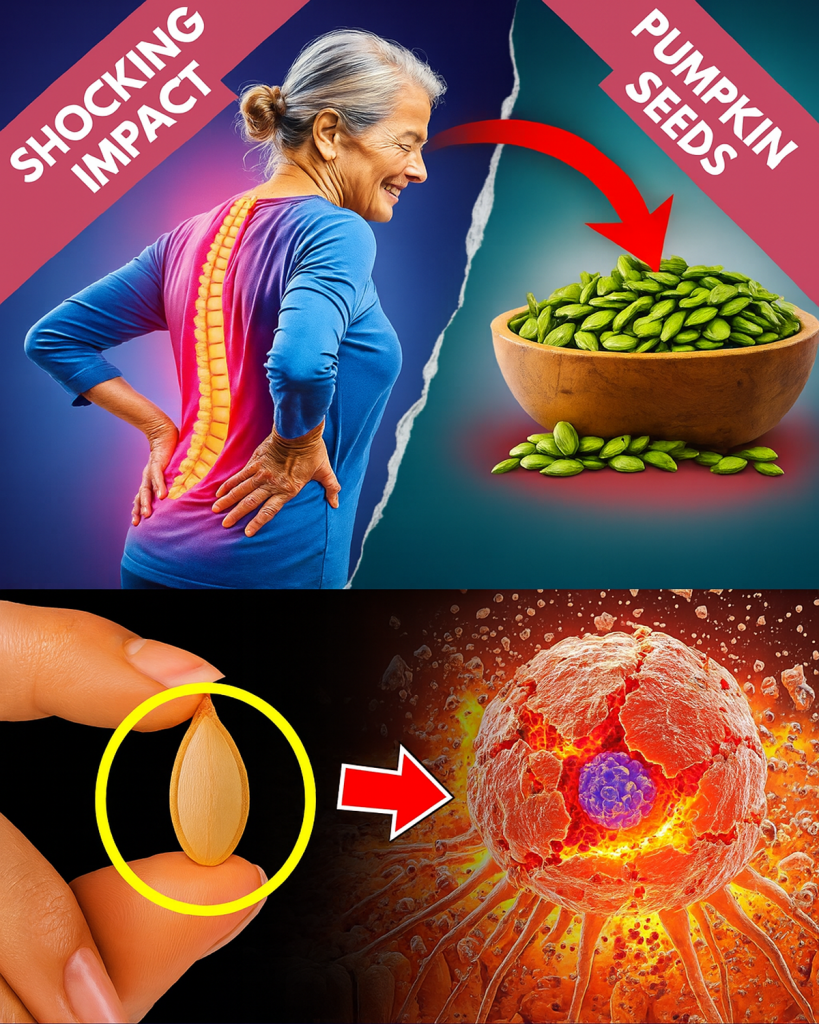
Nutritional Powerhouse in Every Handful
Pumpkin seeds, also called pepitas, are rich in essential vitamins, minerals, and plant compounds. Their dense nutritional profile makes them an ideal daily snack.
Key nutrients in one ounce (28 grams):
- Magnesium: 150 mg (37% DV)
- Zinc: 2 mg (20% DV)
- Iron: 4 mg (23% DV)
- Protein: 7 grams
- Healthy fats: Omega-3 and omega-6 fatty acids
- Fiber: About 1.7 grams
These nutrients explain why pumpkin seeds are linked to multiple health benefits. Let’s explore them in detail.
1. Supports Heart Health
Magnesium is critical for healthy blood pressure and normal heart rhythm. Unfortunately, studies show that up to 50% of Americans are magnesium deficient. A handful of pumpkin seeds daily can help close this gap.
Zinc and antioxidants also contribute to reducing inflammation, lowering LDL cholesterol, and improving overall cardiovascular wellness. Adding them to your diet is like giving your heart daily maintenance.
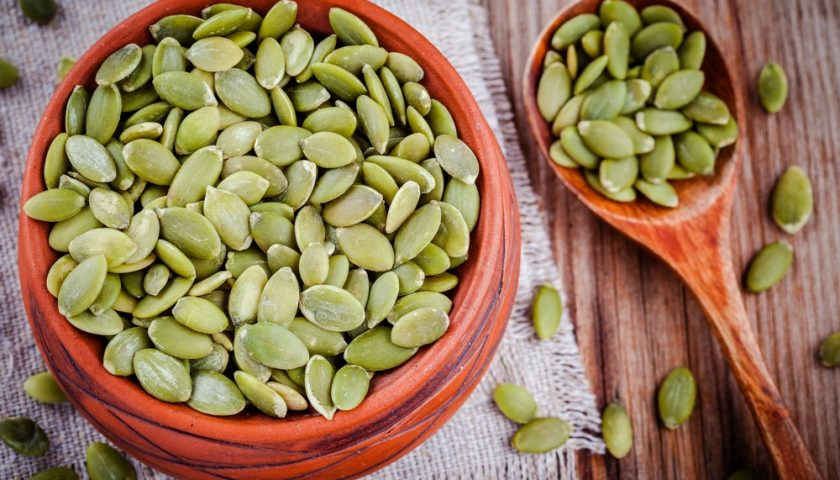
Practical tip: Sprinkle raw or lightly roasted pumpkin seeds on your morning oatmeal or salad to add crunch while supporting heart health.
2. Promotes Better Sleep
If you’ve been struggling with restless nights, pumpkin seeds might be a natural solution. They’re one of the best plant sources of tryptophan, an amino acid that helps produce serotonin and melatonin—the hormones responsible for relaxation and sleep.
Combined with magnesium, which calms the nervous system, pumpkin seeds can help improve both the quality and duration of sleep.
Case example: A friend who dealt with mild insomnia started eating a small bowl of pumpkin seeds as an evening snack. Within two weeks, she noticed falling asleep faster and waking up less often.
3. Strengthens the Immune System
Zinc is often called the “immune mineral.” It supports white blood cell production and helps the body fight off colds, flu, and infections. A daily handful of pumpkin seeds provides around 20% of your zinc needs, making it a tasty way to boost immune defense.
This is especially important during winter or stressful times, when the immune system tends to weaken.
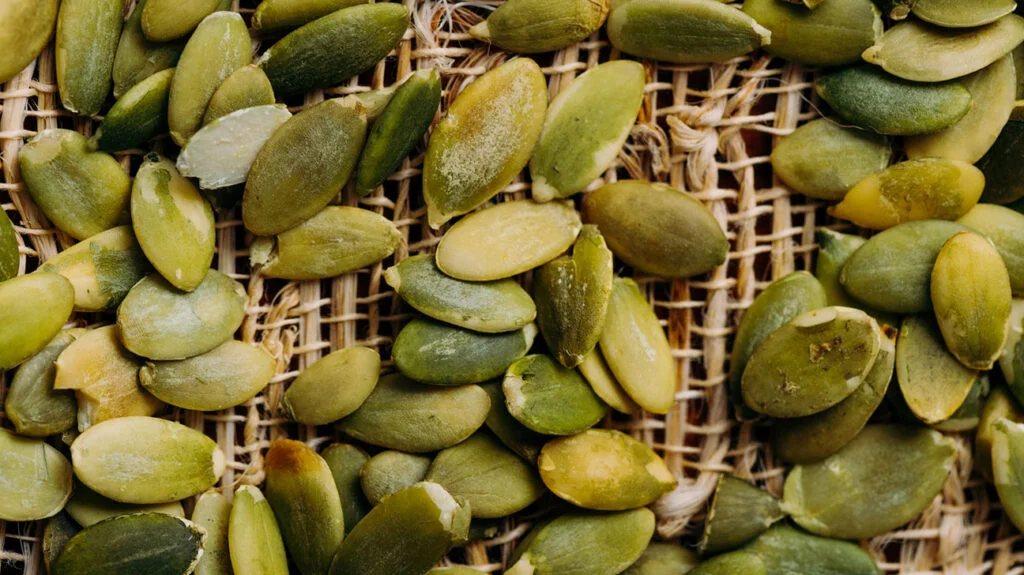
Practical tip: Mix pumpkin seeds into homemade trail mix with almonds, cranberries, and dark chocolate chips for a nutrient-dense snack.
4. Improves Prostate and Bladder Health
Pumpkin seeds have been traditionally used in many cultures to support men’s health, particularly the prostate. Research suggests that pumpkin seed oil and extract may reduce symptoms of benign prostatic hyperplasia (BPH), a condition that affects urination in older men.
In addition, compounds in pumpkin seeds may help improve bladder control, making them beneficial for both men and women.
Note: Always consult with a healthcare professional before using pumpkin seed supplements for medical conditions.
5. Supports Mental Well-Being and Mood
The magnesium and tryptophan in pumpkin seeds don’t just help with sleep—they also play a role in mood regulation. Magnesium deficiency has been linked to anxiety and irritability. By adding pumpkin seeds to your diet, you support neurotransmitter function and brain health.
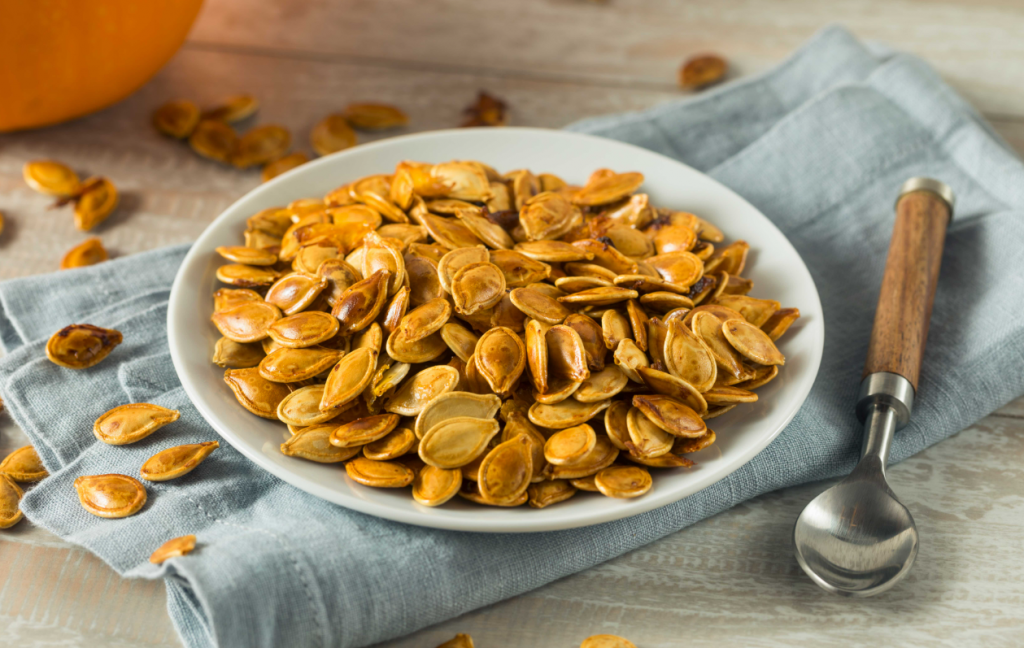
Case example: A college student added pumpkin seeds to her afternoon snack routine during exam season. She reported fewer mood swings and better focus while studying.
6. Promotes Healthy Skin and Hair
Pumpkin seeds are packed with antioxidants, vitamin E, and essential fatty acids—all of which support radiant skin and strong hair. Zinc also aids in wound healing and helps reduce acne flare-ups.
Practical tip: Blend pumpkin seeds into smoothies for a skin-loving nutrient boost, or use pumpkin seed oil as a salad dressing to nourish from the inside out.
7. Balances Blood Sugar
For people concerned about blood sugar control, pumpkin seeds can be a helpful addition. They contain compounds that may improve insulin regulation and lower oxidative stress in people with type 2 diabetes.
When combined with a high-fiber diet, pumpkin seeds help slow digestion and reduce spikes in blood sugar levels.
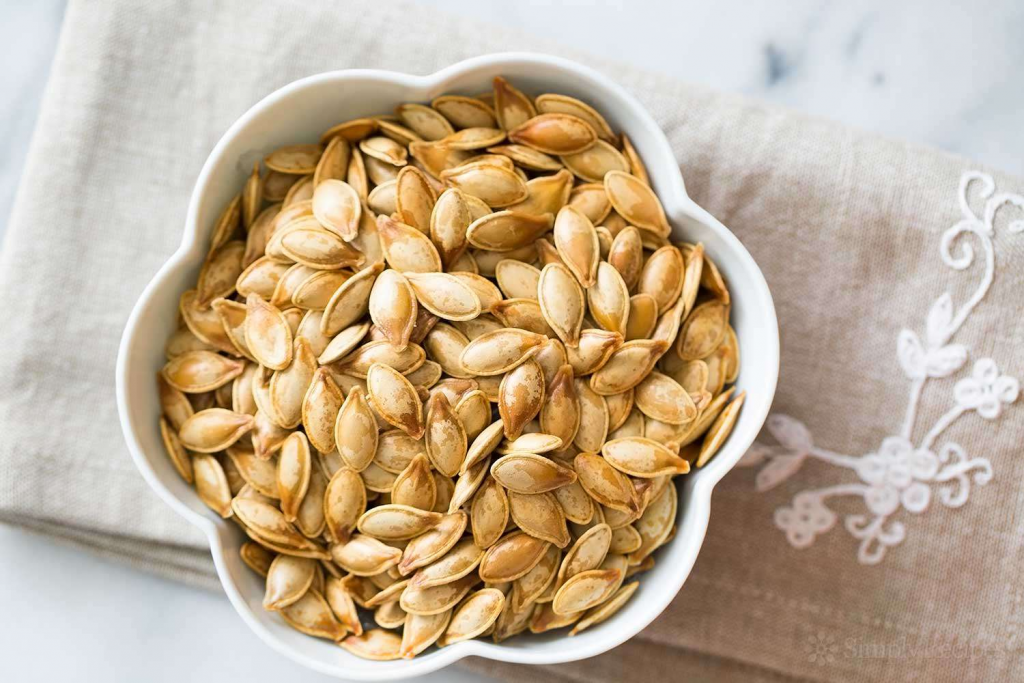
Practical tip: Snack on unsalted pumpkin seeds instead of chips or cookies to keep blood sugar stable between meals.
8. Aids Weight Management
Despite being calorie-dense, pumpkin seeds are rich in protein and fiber, which promote satiety and prevent overeating. Eating them as a snack may reduce cravings for processed foods.
They also provide healthy fats that support metabolism and energy levels, making them an ideal choice for anyone on a weight management journey.
Practical tip: Use pumpkin seeds as a topping for soups or roasted vegetables to feel fuller for longer.
9. Provides Anti-Inflammatory Benefits
Chronic inflammation is a root cause of many health issues, from arthritis to heart disease. Pumpkin seeds contain antioxidants, omega-3 fatty acids, and plant sterols, which work together to fight inflammation naturally.
Case example: An older adult with mild arthritis included pumpkin seed oil in her diet. Over time, she noticed less stiffness in her joints and more flexibility.
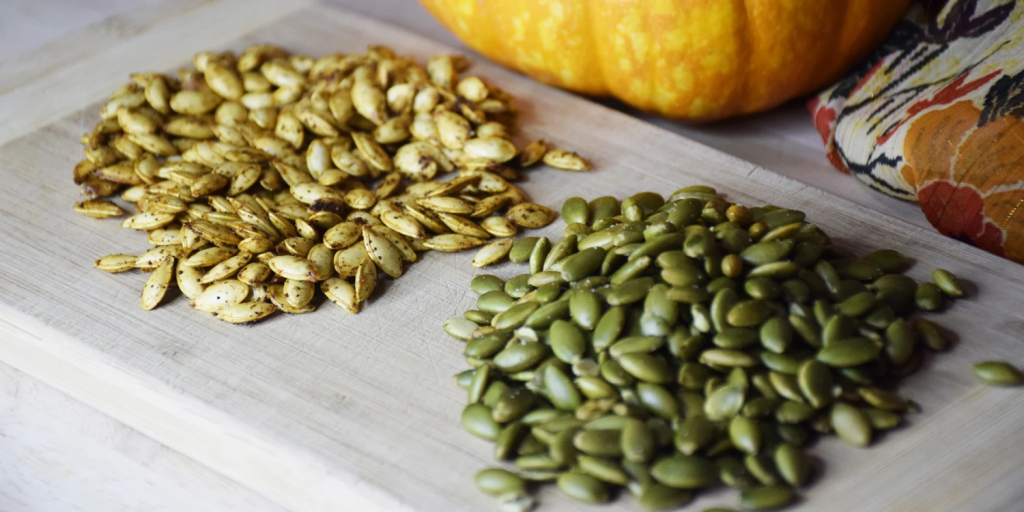
Quick Reference Table of Pumpkin Seed Benefits
| Benefit | Key Nutrients/Compounds | Practical Way to Enjoy Them |
|---|---|---|
| Heart health | Magnesium, antioxidants | Sprinkle on oatmeal or salads |
| Better sleep | Tryptophan, magnesium | Evening snack before bed |
| Stronger immunity | Zinc, antioxidants | Add to trail mix or yogurt |
| Prostate/bladder health | Phytosterols, zinc | Pumpkin seed oil or roasted seeds |
| Mood support | Magnesium, tryptophan | Afternoon snack during stress |
| Skin and hair health | Vitamin E, zinc, omega fats | Smoothies or salad dressings |
| Blood sugar balance | Protein, antioxidants | Replace chips with pumpkin seeds |
| Weight management | Protein, fiber, healthy fats | Topping for soups or roasted veggies |
| Anti-inflammatory support | Omega-3s, plant sterols | Incorporate pumpkin seed oil in cooking |
How to Incorporate Pumpkin Seeds Into Your Diet
Eating pumpkin seeds doesn’t have to be boring. Here are simple, creative ways to enjoy them daily:
- Add to morning smoothies for extra creaminess and nutrients.
- Sprinkle over salads, soups, or roasted veggies.
- Mix with oats, granola, or yogurt bowls.
- Use pumpkin seed butter as a spread for toast or fruit.
- Roast with spices like cinnamon or paprika for a savory snack.
Consistency is key. A small handful (about 1 ounce) daily is enough to reap the benefits.
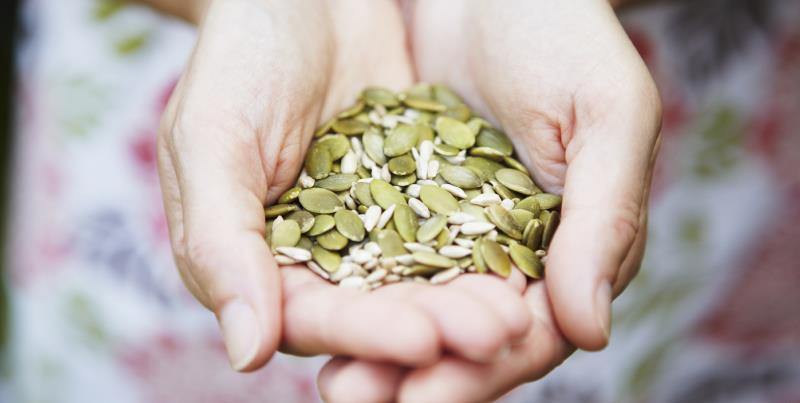
Conclusion
Pumpkin seeds are a small but mighty superfood. Eating just a handful daily can support your heart, sleep, immunity, skin, and overall vitality. Whether you enjoy them raw, roasted, or blended into recipes, they are one of the simplest and most affordable ways to improve health naturally.
FAQs (Quick Takeaways):
- How many pumpkin seeds should I eat daily? Around 1 ounce (about a handful) is ideal.
- Are they safe for everyone? Yes, but people with nut or seed allergies should consult a doctor.
- Do roasted seeds still have benefits? Yes, though raw or lightly roasted retain the most nutrients.
This article is for informational purposes only and is not a substitute for professional medical or dietary advice. Always consult with a qualified healthcare provider for personalized recommendations.




